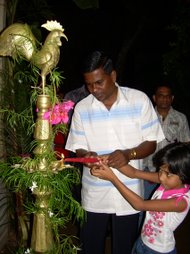ENGLISH OUR WAY: I BEG TO DISAGREE
www.dailymirror.lk
English is English. There are different ways (and uses) of English in different countries. For instance Australians say (‘Good die’ for ‘Good day’) and the Americans pronounce ‘vase’ with an "eh" as against "vase" with an ‘ah). In one particular song ‘potato is sounded (with an oh) as against "potato" (with an ‘ah’), and "tomato" with an ‘eh) and not "tomato" (with an ah). The end of the song goes –"so let's call the whole thing off". Very prophetic and very true.
People can pronounce the language the way they wish. However, it is very embarrassing when God becomes ‘goad’ and Lord becomes ‘load’ and as the Southern folk in America used to say "oh lordy" which typifies attempts to get people to speak English naturally, not with an accent nor in "elocuted" speech which as they have said in the papers is of no use to anyone. However, speech students should be given phonetic sheet with some of the problem areas which are parts of speech patterns of both Tamil and Sinhala people when speaking English. Some examples of mispronunciations are:
For and four, jaw and ‘Jaw’ and caw and ‘co’. Mother-in-law becomes a ‘mother-in-low’, and bought becomes ‘boat’ while if someone ‘caught’ something, the person would end up wearing it with a ‘coat’. Paul becomes a pole and Mr Shawn becomes a person who is ‘shown’ off with his speech patterns.
One can easily identify the nationality of the person from these speech patterns. For example whether you are Indian or of some other origin abroad, you may not be attacked by students who feel that Asians who come to their countries with their cell phones and Nike shoes (not realizing that they are cheap imitations) to study though they get less than the average requirement which prevent them from entering universities in their own countries. Sri Lankans as a race meld and blend with their overseas colleagues because they are very low profile. This is an advantage on one hand and a disadvantage on the other because we do not seem to have the personality to raise protests against regimes and unfair practices unlike in India where the masses get onto the streets and protest–if for example, even the price of rice goes up beyond the average user’s purse. However, while the person is in Sri Lanka, whatever form of English he/she chooses to use, is of little consequence because in the context of the sentence it may be understood. In a foreign country, to get your message across, it is essential that collective English is taught in schools. It is also important that the form of English is in a pattern that is used by most foreign English speaking countries because it would be most frustrating for both the speaker and the listener to have to analyze what the person is attempting to say.
In its written form, English must be taught as IT IS, and cannot be varied because the teachers are those who write a pure form of English (if the subject is related to English language such as an honours degree in literature or English). The inclusion of articles before nouns that match (not collective nor uncountable) is of absolute essence. Sinhala Language and Tamil Language seem devoid of articles. In teaching English, unlike French, the article and noun association is not taught.
A professor has already created ‘Singlish’ (which I think is the best approach the hierarchy in education are trying to implement because it teaches the sounds associated with some of the pronunciations and writing but not too correct in spellings). But, it is again a new language with its typification of the tied sounds such as ‘cl’ (as in club and neither in the Sinhala nor Tamil Language) translated into a form that can be recognized by those who use Sinhala. The Tamil people who do not speak Sinhala cannot use this form. Now one can easily understand if a person says "I want a glass of water", because it comes in a glass and there is a link to the collective noun “water". However, the expression "I want voter" because it lacks both the container and the article and the correct pronunciation makes one sound like a political candidate. One must be practical in approach in modifying an existing practice–in this case the language–because the effects of what is taught has a far reaching and negative consequence in the light of usage. To show you the far reaching and distortion of human rights was the Rent Act of 1972; thoughtless but implemented and the people are suffering today, both landlords and tenants because the tenants who profited off the system, have children and grandchildren up to the 7th generation do not have homes today. Late President Premadasa attempted to alleviate this misery with "the houses for all" project. There is already enough of distortion in the use of the language in laws and regulations that use "can be permitted at the discretion of the authority" thereby allowing all illegalities to ensue. On the point of English, it would be far better if the Constitution is changed to address "privacy" and "freedom of speech" instead of attempting to change a language to "our version of it". By doing so at the spoken level, it is very likely that distortion will arise in the written form as well and will be detrimental to the children who want to study overseas or live overseas in English speaking countries. On a matter of understanding English, it would be far better to teach children the correct use in both written and spoken forms because no conflict will arise in all approaches to the language–in spellings, pronunciation and writing.
At a recent interview, the use of "interfere" was used instead of "intervene" which put the speaker’s message clearly out of synchronization with what the speaker actually wanted–in this instance from the foreign community. Nobody will ‘interfere’ because it is against human rights, but to ‘intervene’ means friendly and peaceful intervention. This lucidity is more salient in messaging than changing the language.
Andrea Brito Babapulle





No comments:
Post a Comment